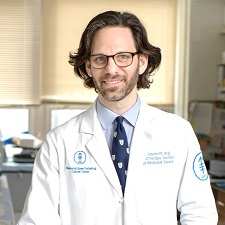A form of cancer immunotherapy termed adoptive T cell transfer (ACT) can induce long-lasting remissions in patients with advanced blood cancers. In this approach, T white blood cells specific for proteins found on the surface of cancer cells (antigens) are activated and expanded outside the immunosuppressive environment of a cancer patient's body before re-infusion as a therapy. Thus far, this promising form of cancer immunotherapy has failed to work in most patients with cancers arising from solid organs, the leading cause of cancer-related deaths in adults. Two critical gaps in knowledge limit the ability of ACT to be successfully applied to solid cancers: 1) understanding which antigens on the surface of cancer cells can be targeted by T cells that do not have the potential to cross-react and injure normal tissues, and 2) insight into what factor(s) limit the ability of transferred T cells to expand and persist following re-infusion into a patient. Dr. Klebanoff seeks to use a genetic engineering approach to simultaneously address both these issues. Success of these efforts would be a decisive step forward toward extending the ability of ACT to deliver potentially curative responses in patients with common cancers, including those arising from the breast, uterus, cervix and colon.
Damon Runyon Researchers
Meet Our Scientists
Christopher A. Klebanoff, MD
Project title: "Clinical development of next-generation T cell receptor (TCR)-based adoptive immunotherapies for the treatment of patients with common epithelial malignancies"
Institution: Memorial Sloan Kettering Cancer Center
Award Program: Clinical Investigator
Sponsor(s) / Mentor(s): Michel Sadelain, MD, PhD, and Larry Norton, MD
Cancer Type: Gynecological, Kidney and Bladder, Breast
Research Area: Immunotherapy







